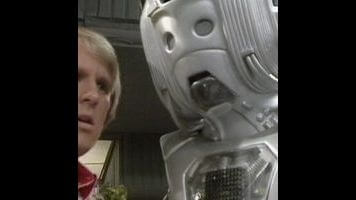Doctor Who (Classic): “The Pirate Planet”

“The Pirate Planet” (Season 16, episodes 5-8. Originally broadcast Sept. 30-Oct. 21, 1978.)
“The Pirate Planet” is one of those stories that, on paper, sounds like it should be more entertaining and thought-provoking than it actually is. It’s got a teleporting planet, Zanak, that devours other worlds like a vampire. It’s got a half-robot pirate captain with a killer mecha-parrot on his shoulder, who rules through fear and bombast and nurses a secret plan of vengeance that will flip our understanding of the plot. It’s got a fight to the death between that robot parrot and a robot dog. It’s got a cult of creepy, near-invincible telepaths. It’s got a potent metaphor for the violence of the dark side of capitalism, and the willful blindness of those who benefit from it. And, of course, it’s got a script by Hitch-Hikers’ Guide To The Galaxy author Douglas Adams, exactly the writer you’d want to help usher in the comedic approach to sci-fi that Doctor Who strove for in its sixteenth season, which set the Doctor off on a wide-ranging quest for a powerful cosmic artifact called the Key To Time.
And yet for all that is genuinely fun and clever about “The Pirate Planet,” it’s also surprisingly boring for fairly long stretches, before picking up steam again in the last episode. Worse, it’s almost fatally torpedoed by the shouty, unsubtle performance of Bruce Purchase as the Captain, a one-note bloviation that ranks as one of the worst depictions of a major villain in the whole series.
Before I get into the story itself too deeply, let’s look at the lay of the land for Doctor Who in 1978. Season 16 was the second year of Graham Williams’ tenure as Doctor Who producer, which he’d taken over with strict orders to tone down the violence and the horror elements that had caused scandal when his predecessor Phillip Hinchcliffe was showrunner. There was probably no way to completely eliminate monsters and scares without putting a stake through the heart of Doctor Who, and I’m sure Williams had no intention of going that far, but under his watch things wouldn’t be taken quite so seriously anymore. Williams instead aimed for lighter storylines and kid-friendly touches like the addition of K9, the Doctor’s robot pet. One of the cornerstones of Williams’ plan was a season-long quest that would connect all six of the year’s serials via the Doctor’s search for the six parts of the Key To Time, desired by two godlike, diametrically opposed figures, the White and Black Guardians. The Doctor also got a new companion, a female Time Lord named Romana who lacked his experience but was more than a match for him in intelligence and personality—as played by Mary Tamm, she was an excellent foil, able to puncture the Doctor’s vanity and arrogance with ease. The season-opening “The Ribos Operation” set the stage for the overarching quest storyline with a terrific, surprisingly small-stakes story about a con job. The remainder of the Key stories never quite reached that level of quality again, but all of them (except the finale, unfortunately) are fairly solid, entertaining mid-range Doctor Who, and helped drive the Classic-era show to its popular peak the following season, when “City Of Death” pulled in its highest ratings in history.
In some important ways, going lighter was the right approach for the time. Doctor Who usually works best when it strikes a balance between the humorous and horrific, and a decent argument can be made that stories like “The Seeds Of Doom” and “The Deadly Assassin” had shifted that balance too far. (Perhaps ironically, the comedy in “Pirate Planet” was criticized by the same BBC execs who had demanded the lighter tone in the first place.) And the Doctor himself is such a nontraditional hero that he’s a natural fit for quirkier stories in any of his incarnations—but especially with Tom Baker’s toothy, goggle-eyed Fourth Doctor as the central character. As much as I love the scarier material, Doctor Who would lose something essential if traveling through time and space seemed like it would be a neverending flight from nightmare to nightmare. If it’s no fun, you might as well stick to one planet and one century like some kind of chump. Plus, the show’s low budget and often ramshackle effects meant it was hard pressed to stage something with the cosmic grandeur of 2001: A Space Odyssey. Making fun of itself was a good way to wink at the audience and ask them to suspend disbelief over cardboard sets and meet the show halfway.
“The Pirate Planet” was written by Adams at the same time as he was working on the first Hitch-Hikers’ Guide To The Galaxy radio series, and their shared sensibility is obvious, from the freewheeling, chaos-spreading rebel heroes in both stories to Adams‘ love of working up elaborately structured, ambitious sci-fi plots that he disguised with a top layer of satiric eviscerations of the genre’s sillier cliches. In this case, that’s embodied by the deliberately outlandish figure of the Captain, who’s presented at first as an insanely violent megalomaniac whose pompous mannerisms are a parody of the very kind of shouty, bullheaded villains that were Doctor Who’s stereotypical galactic menaces.
But self-consciously ironic comedy like Adams’ all too easily descends into overacting and campiness if it’s not played carefully. That was a particular danger for Baker, whose acting style only grew more over-the-top as time went on. His worst habits are only just starting to show through here, though, and his moments of Shatnerian silliness are well countered by his palpable outrage at Zanak’s global-scale stripmining operation, which has the nasty side effect of eliminating all life on its target planet.









![Rob Reiner's son booked for murder amid homicide investigation [Updated]](https://img.pastemagazine.com/wp-content/avuploads/2025/12/15131025/MixCollage-15-Dec-2025-01-10-PM-9121.jpg)

























![HBO teases new Euphoria, Larry David, and much more in 2026 sizzle reel [Updated]](https://img.pastemagazine.com/wp-content/avuploads/2025/12/12100344/MixCollage-12-Dec-2025-09-56-AM-9137.jpg)




